Hi all,
I guess many of you are familiar with the type of bascinet often shown on English brasses and effigies between about 1410 and 1440:
[ Linked Image ]
My question is, what evidence do we have about how these three parts fitted together, and are there any good images of reconstructions?
Thanks,
Matt
Isn't that just a great bascinet without a visor? http://www.myArmoury.com/feature_spot_bascinet.html
Here are some better images http://tgorod.ru/index.php?topgroupid=2&g...tentid=208
| Matt Easton wrote: |
| Hi all,
I guess many of you are familiar with the type of bascinet often shown on English brasses and effigies between about 1410 and 1440: [ Linked Image ] My question is, what evidence do we have about how these three parts fitted together, and are there any good images of reconstructions? Thanks, Matt |
Journal of Armour Research Society vol1 ISSN 1557-1297, has an article on 3 15th C effigies in Aberdeen.
A little late for your question, 1420ish to 1450ish, but on page 8 there is a nice detail showing relationship of the wrapper bevor and helmet of a great bascinet. I would post a picture but my camera batteries are dead.
Here the picture:
post edited to include picture of the article fig
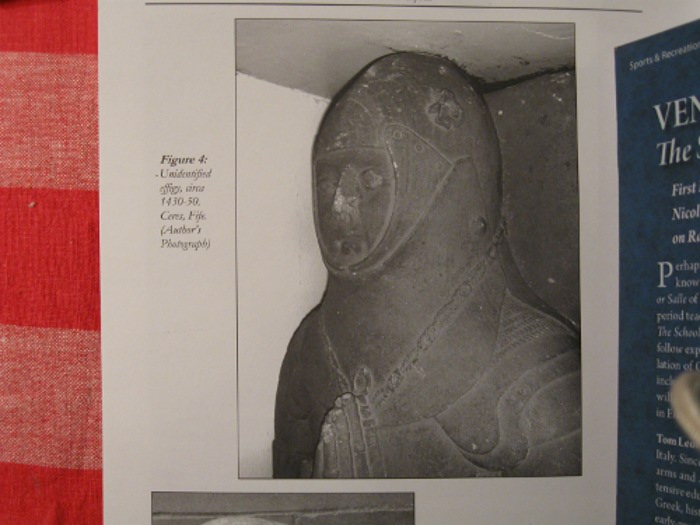
figure 4 Observations on the Amour depicted on three Mid-15th-century Effigies in Kirk of St. Nicholas, Aberdeen by Tobias E. Capwell, Journal of the Armour Research Society Volume 1, 2005
Last edited by Mackenzie Cosens on Tue 21 Feb, 2012 12:33 pm; edited 1 time in total
I am currently getting a suit of English Plate constructed based off an effigy almost identical to the one you pictured. The best reference I've seen that specifically doesn't involve a Great Bascinet with an attached bevor plate has come from a suit that James Arlen Gillaspie designed for a Henry V movie/tv project that fell through. You can see the suit on his site here: http://mysite.verizon.net/tulkaz/1430.html
In addition, I have been able to collect some images and drawings of what I believe is actually being illustrated in the effigies (that being a separate iron collar that is free of the bascinet, rather than a great bascinet with attached bevor plate.
Furthermore, although I am loathe to admit it, I have also utilized images from the armor worm by Laurence Olivier in Henry V. Admitedly these seem to have taken the most artistic license from the effigies, however I believe that they still illustrate how the pieces interact sufficiently.
The1st picture shown below is an image of a similar harness made by Robert MacPherson for Toby Capwell. Specifically it details the collar and helm. Unfortunatley, I have spoken with neither Robert nor Toby regarding the specifics of these pieces, and I have also heard conflicting reports that infact although the collar is separate, it is anchored to the back of the bascinet (so effectively would be about the same as the Grand Bascinet with bevor plate). Without verification it remains to be seen if in fact this is the correct interpretation.
 Attachment: 29.09 KB
Attachment: 29.09 KB
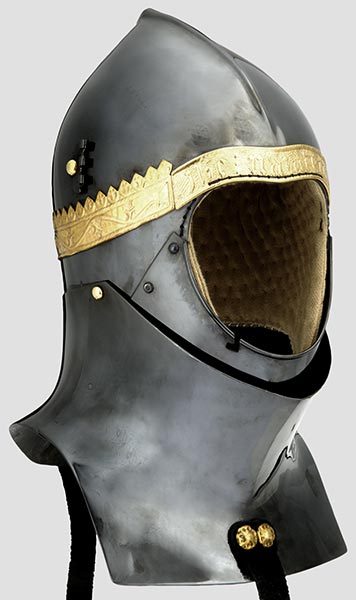
Robert Mac's interpretation for Toby's english harness.
 Attachment: 70.45 KB
Attachment: 70.45 KB
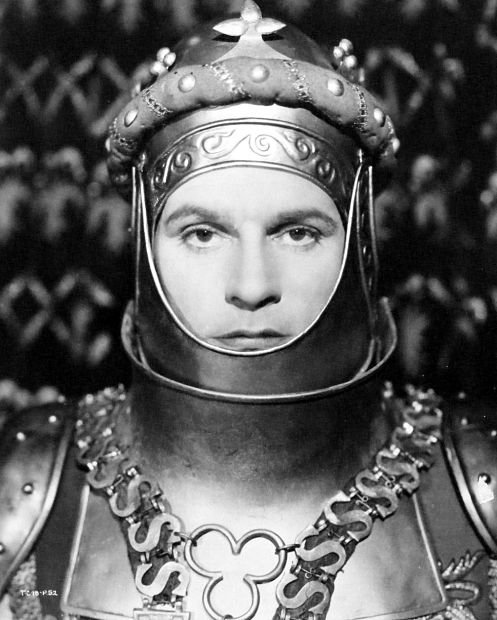
In addition, I have been able to collect some images and drawings of what I believe is actually being illustrated in the effigies (that being a separate iron collar that is free of the bascinet, rather than a great bascinet with attached bevor plate.
Furthermore, although I am loathe to admit it, I have also utilized images from the armor worm by Laurence Olivier in Henry V. Admitedly these seem to have taken the most artistic license from the effigies, however I believe that they still illustrate how the pieces interact sufficiently.
The1st picture shown below is an image of a similar harness made by Robert MacPherson for Toby Capwell. Specifically it details the collar and helm. Unfortunatley, I have spoken with neither Robert nor Toby regarding the specifics of these pieces, and I have also heard conflicting reports that infact although the collar is separate, it is anchored to the back of the bascinet (so effectively would be about the same as the Grand Bascinet with bevor plate). Without verification it remains to be seen if in fact this is the correct interpretation.

Robert Mac's interpretation for Toby's english harness.

Thanks Neal, this is excellent information.
I have seen Toby's bascinet but didn't pay enough attention at the time, as I was originally aiming a bit earlier and going for an aventail. I remembered it as a great bascinet, but looking at the photo above my memory seems to have been wrong.
I had seen Gillaspie's Henry V style armour and this was what I remembered quite clearly, but I do not know how the source evidence weighs up on the effigies between these being completely separate collars, as shown on the examples above, or whether it was simply a great bascinet with a one-piece skull and back, with the front collar rivetted on (as found on some French and Italian examples surviving). Claude Blair talks about the latter continental type, but doesn't suggest that English examples were mae different with a free floating collar. Given the English manner of usually fighting on foot at this time, and the fact that free floating collars existed in the 14th century in England (as seen on the Hastings Brass) I find it fascinating that they may have used helmets that were characteristically English, rather than being like the French great bascinets with a solid and rigid back.
I have seen Toby's bascinet but didn't pay enough attention at the time, as I was originally aiming a bit earlier and going for an aventail. I remembered it as a great bascinet, but looking at the photo above my memory seems to have been wrong.
I had seen Gillaspie's Henry V style armour and this was what I remembered quite clearly, but I do not know how the source evidence weighs up on the effigies between these being completely separate collars, as shown on the examples above, or whether it was simply a great bascinet with a one-piece skull and back, with the front collar rivetted on (as found on some French and Italian examples surviving). Claude Blair talks about the latter continental type, but doesn't suggest that English examples were mae different with a free floating collar. Given the English manner of usually fighting on foot at this time, and the fact that free floating collars existed in the 14th century in England (as seen on the Hastings Brass) I find it fascinating that they may have used helmets that were characteristically English, rather than being like the French great bascinets with a solid and rigid back.
I have added a picture of the from the article I referenced
OK,
Editing my original post doe not push it to the top of the stack, so lets see if quoting my post will get it to pop.
My apology if the image show up twice, I am having a "fun" with computers day kind of day.
mackenzie
2 points if you know the author and title of the book holding the Journal open :)
 Attachment: 91.76 KB
Attachment: 91.76 KB
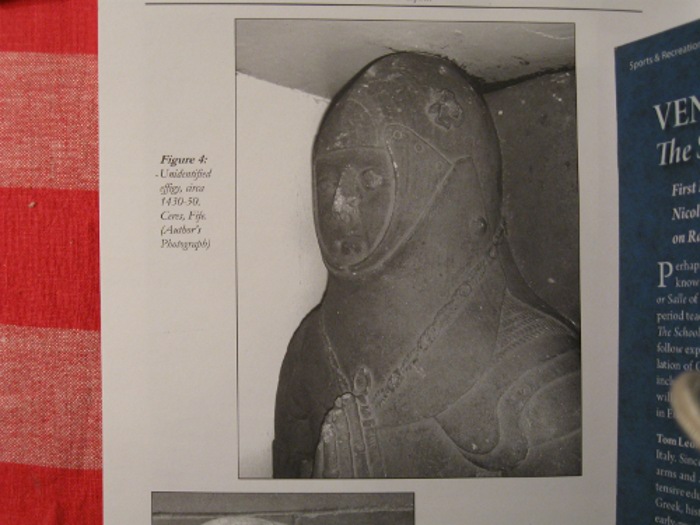
OK,
Editing my original post doe not push it to the top of the stack, so lets see if quoting my post will get it to pop.
My apology if the image show up twice, I am having a "fun" with computers day kind of day.
mackenzie
2 points if you know the author and title of the book holding the Journal open :)
| Mackenzie Cosens wrote: | ||
Journal of Armour Research Society vol1 ISSN 1557-1297, has an article on 3 15th C effigies in Aberdeen. A little late for your question, 1420ish to 1450ish, but on page 8 there is a nice detail showing relationship of the wrapper bevor and helmet of a great bascinet. I would post a picture but my camera batteries are dead. Here the picture: post edited to include picture of the article fig |

Thanks Mackenzie, very useful. I wonder though if this is exactly the same type of helmet as they were trying to show on most English effigies and brasses, first because it is Scottish and I believe they followed French fashion more (for example see the visor atachment) and secondly because a number of the English ones appear not to have a one-piece back, but rather seem to show the back of the neck/gorget as a separate piece.
Examples:
http://effigiesandbrasses.com/static/monument..._r3229.jpg
http://effigiesandbrasses.com/static/monument..._r2352.jpg
http://www.flickr.com/photos/roelipilami/1578...432104851/
But maybe all this shows is that there was a development from the gorget section being separate in the earlier period (say 1410-20), to the back becoming solid (by say 1425ish) and then the classic great bascinet we are familiar with?
Matt
Examples:
http://effigiesandbrasses.com/static/monument..._r3229.jpg
http://effigiesandbrasses.com/static/monument..._r2352.jpg
http://www.flickr.com/photos/roelipilami/1578...432104851/
But maybe all this shows is that there was a development from the gorget section being separate in the earlier period (say 1410-20), to the back becoming solid (by say 1425ish) and then the classic great bascinet we are familiar with?
Matt
Check out the bascinets in this illumination - to me they look more like Gillaspie's version, with an almost separate gorget:
[ Linked Image ]
[ Linked Image ]
The more examples I am finding, the more variation there seems to be between them. This effigy from Canterbury Cathedral of the Duke of Clarence, who died in 1421, shows the way the plates are arranged very clearly:
 Attachment: 30.13 KB
Attachment: 30.13 KB
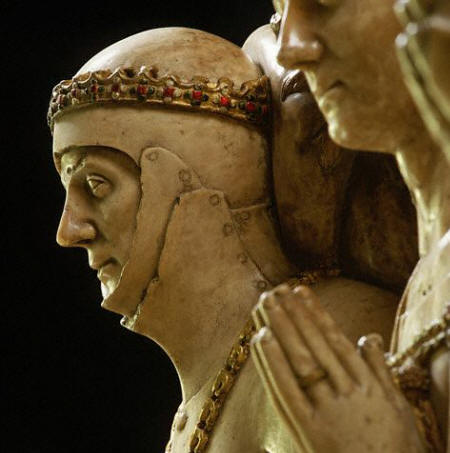

I have the impression that this illumination showed nasty foreigner in strange armour attacking. Of course the guy in the kettle hat on the wall appears to have a gorget.
My triva-only memory tells me there are examples of detached gorget in the English context that are from early mid 14th Century, some of them quite famous, I will see if I can find an image or two.
My triva-only memory tells me there are examples of detached gorget in the English context that are from early mid 14th Century, some of them quite famous, I will see if I can find an image or two.
| Matt Easton wrote: |
| Check out the bascinets in this illumination - to me they look more like Gillaspie's version, with an almost separate gorget:
[ Linked Image ] |
Yes, in the Hastings Brass of c.1349.
Yep the Hastings brass and the one with the kettle hat on the bascient in the same series.
Here one that I think is French, it might be useful for comparing against the Scottish one.
mackenzie
 Attachment: 40.08 KB
Attachment: 40.08 KB
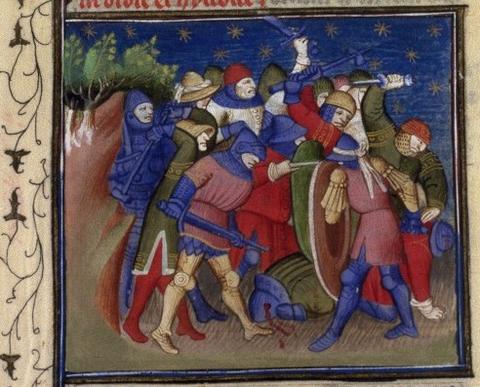
Here one that I think is French, it might be useful for comparing against the Scottish one.
mackenzie

Some more of this type http://forum.salisbury.com.ua/viewtopic.php?f=3&t=496
Great stuff, thanks chaps. :)
Page 1 of 1
You cannot post new topics in this forumYou cannot reply to topics in this forum
You cannot edit your posts in this forum
You cannot delete your posts in this forum
You cannot vote in polls in this forum
You cannot attach files in this forum
You can download files in this forum
All contents © Copyright 2003-2006 myArmoury.com — All rights reserved
Discussion forums powered by phpBB © The phpBB Group
Switch to the Full-featured Version of the forum
Discussion forums powered by phpBB © The phpBB Group
Switch to the Full-featured Version of the forum